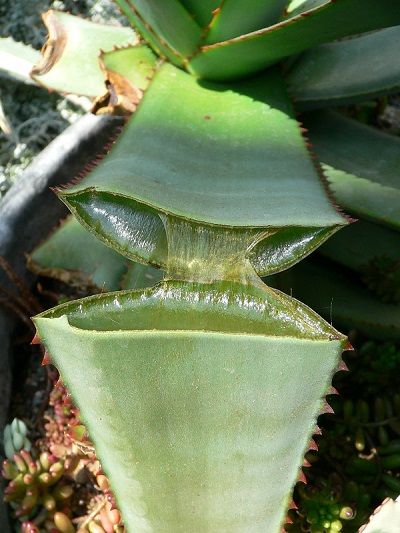Say 'ello to Aloe
History and Botany
The earliest records of aloe were written on clay boards of Nippur in Mesopotamia over 4000 years ago, describing a cleansing effect on the intestinal system. The "papyrus Eber" from 1550 BC in Ancient Egypt, reveal aloe was highly regarded for its nourishing juice, used for skin care, and used in the embalming process, presumably due to antibacterial and antifungal properties. It has maintained a nearly divine reputation in many cultures throughout the centuries as a magnificent healing plant.
Aloe Vera ("true" aloe) is common name for species that includes aloe barbadensis mill. It is a fleshy perennial plant with triangular-shaped, serrated leaves. It grows wild in tropical climates worldwide, and is cultivated for medicinal and commercial use. It makes an excellent potted plant, but be cautious of ingesting an aloe plant unless you are certain it was grown organically or according to pharmaceutical standards. You can read more about the growing process and all about aloe here.
Uses & Benefts
Aloe vera has more than 75 potentially bioactive compounds including vitamins, minerals, enzymes, anthraquinones, sugars, amino acids, salicylic acids and more! The short list includes vitamins A,C,E, B12, Folic Acid & Choline, minerals calcium, chromium, magnesium, potassium, and zinc. Eight enzymes including amylase, cellulase and lipase aid digestion of carbs, sugars, and fats; bradykinase enzyme helps soothe inflammation topically. Anthraquinones a.k.a. laxative compounds aloin and emodin also act as analgesics, antibacterials and antivirals. Sugars, monosaccharides (glucose and fructose) and polysaccharides like glucomannan are present in the inner gel and outer leaf mucilage layer. Polysaccharides make up about 6-15% of the solids in aloe vera, but can be destroyed by heat and enzymes during processing.
Skin Healing & Protection - The glucomannan and gibberellin (growth hormone within aloe) were found to work together to stimulate collagen synthesis, particularly type III, as well as hyaluronic acid which hastened wound healing in one study where aloe was used both topically and orally. Some studies found a protective effect against UV and gamma radiation. Although it is not advised to be used instead of sunscreen, it does appear to speed the healing of burns. Topically, aloe vera has been used to treat psoriasis, even herpes and cold sores. Polysaccharides help bind water to skin, while zinc acts as an astringent, which improves the tone and texture of skin. You'll often see aloe vera used in face and body products due to these moisturizing and anti-aging properties.
Anti-Inflammatory & Antioxidants - Aloe vera inhibits the cyclooxygenase (inflammatory) pathway and contains anti-oxidant ACE vitamins, which fight free radical damage. Some studies found most antioxidant activity in the leaf skin. Fighting free radicals and managing inflammation are great ways to stay healthy!
Digestion & Constipation - The combination of digestive enzymes, ph balancing effects, and soothing properties make aloe potentially beneficial for GI problems like ulcers and IBS, though more research is needed. The latex just inside the outer leaf contains anthraquinones with laxative effects: increases water content in intestines, stimulates mucus secretion and increases peristalsis.
Blood Sugar Balancing - Some evidence in human and animals suggest aloe may be effective for diabetics with chronic hyperglycemia to reduce blood glucose and serum triglyceride levels. A review of studies published in The Journal of Alternative and Complementary Medicine, found that aloe supplements lowered blood sugar levels in both prediabeti and diabetic individuals. The greatest reductions were seen in people with the highest blood-sugar levels.
Anti-Cancer activity - Aloin, an anthraquinone, is a major compound in aloe which has shown to inhibit the proliferation of cancer cells. Additionally, a polysaccharide fraction has shown to prevent the formation of pro-tumor compounds in rats, though more studies are needed.
Aloe Juice, Gel & Supplements
try 'em out this August
Safety & Side Effects:
Topical: Aloe latex is not well tolerated by some people, it is best to test aloe gel on a small area to see if you react. May cause redness, burning, or stinging in sensitive individuals. May also increase absorption of steroid creams.
Oral: Excessive or long-term use may cause cramps, diarrhea, hepatitis, dependency or worsening of constipation. Laxative effect may cause electrolyte imbalance (low potassium). Do not take aloe if you have known allergy to the Liliaceae family (onions, garlic, tulips.) It may have a blood sugar lowering effect that could be enhanced if taking other medications like insulin.
*Always consult your healthcare professional before using aloe vera medicinally. This list of precautions and benefits above is not complete and should not be seen as medical advice.


